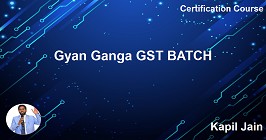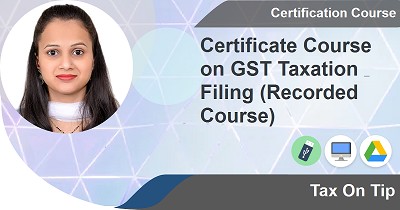GST Assessments, Scrutiny (Old and New norm), Departmental Audit

Course Description
GST Assessments
- Self-Assessment: An explanation of how taxpayers assess their own taxes and determine the tax liability.
- Provisional Assessment: Discussion of situations where normal tax liability cannot be determined. Explanation of the application process, security provision, and finalization of provisional assessments.
- Scrutiny of Returns: Elaboration on the systematic analysis of returns after filing, the process involved, and the response to discrepancies. Both old and new instructions would be covered.
- Assessment of Non-Filers: Examination of the procedure when a registered person fails to furnish a return.
- Assessment of Unregistered Persons: Explanation of the assessment procedure for unregistered persons identified as liable for tax.
Scrutiny under GST (Old and New Norm)
- Concept and Process of Scrutiny: Thorough discussion of the initial system of scrutiny, including how returns were examined for accuracy and why.
- Analysis of Old Scrutiny Norms: Detailed analysis of the procedure under the old norms and how to handle notices and discrepancies.
Scrutiny under GST (New Norm)
- Overview of New Scrutiny Norms: Explanation of the changes in scrutiny norms and how they affect the filing and examining process. Discussion on how to ensure compliance under the new norms.
- Impact on Tax Professionals: Detailed discussion on how these changes will affect the roles and responsibilities of tax professionals.
Departmental Audit
- Audit under GST: Definition of audit under GST, persons required to get their accounts audited, and the criteria for audit.
- Audit by Tax Authorities: Discussion on how and when tax authorities conduct an audit, the audit process, and the rights and responsibilities of the auditee.
Benefits for Indian Tax Professionals
- Enhanced understanding of GST Assessments and Scrutiny: This will empower them to assist their clients more effectively in navigating these processes.
- Update on old and new scrutiny norms: This will enable them to adapt to the changing landscape of GST norms and regulations.
- In-depth knowledge of Departmental Audit: This will prepare them to assist and represent their clients during audits.
- Case studies: Real-world examples will provide practical insights and better understanding of the topics discussed.
- Skills Development: Improve their analytical skills and knowledge in dealing with GST related matters, thereby increasing their value and marketability in the field.
- Compliance: Understand how to ensure the compliance of their clients or their organizations with the GST norms and regulations.
- Networking:Opportunity to interact with other professionals and experts in the field, exchange ideas, and expand their professional network.
Meet Your Instructor
Have Questions About This Course?
Our course advisors are here to help you make the right decision for your career growth.
Other Courses

Gyan Ganga GST BATCH
Kapil Jain

New Income Tax Batch
Kapil Jain

Tally with Tax Course
CA Ashish B. Deolasi
Join Us
List your Class
Share your knowledge and help shape the next generation of tech-savvy CA & Tax professionals while building a rewarding career in education.
Get Started



 CAclubindia
CAclubindia
